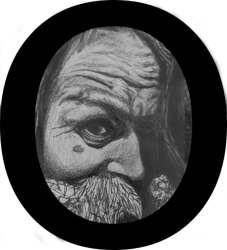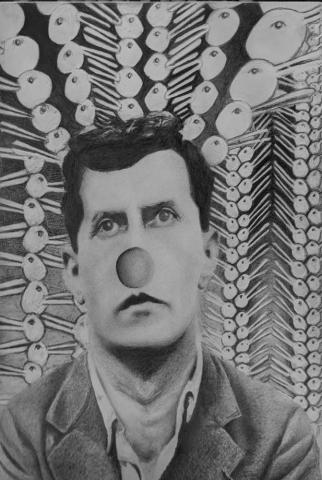ChatGPT bio:
In the labyrinthine corridors of philosophical thought, a name emerges, resonating with profound enigma and linguistic wizardry—a name that invokes both puzzlement and illumination, Ludwig Wittgenstein. Born in the crucible of Vienna in 1889, Wittgenstein traversed the boundaries of logic and language with a virtuosic flair that defied categorization, giving rise to a dual legacy of perplexity and perspicuity.
From his early forays into the arcane realm of logic, Wittgenstein emerged as a philosopher whose ideas were tantalizingly two-faced, oscillating between the crystalline clarity of Tractatus Logico-Philosophicus and the labyrinthine complexity of his later work, Philosophical Investigations. In the former, he presented a veritable Philosopher's Stone, purporting that the limits of language delineate the limits of our world—an incantation that led many to mistake him for a logical positivist, adrift in a sea of verifiable propositions. Yet, beneath the surface, the Tractatus concealed a tantalizing paradox: its own assertions transcended the bounds it purported to set, rendering it an enigmatic Ouroboros, eating its own tail.
Wittgenstein's later oeuvre, the Philosophical Investigations, metamorphosed his philosophical persona, revealing a second face—a face that discarded the austere monolith of the Tractatus for a more dynamic, language-game-infused vision. Here, he invited us to navigate a linguistic labyrinth where meaning was not etched in stone tablets but woven into the fabric of social practices. In this expanse, language shimmered like a chameleon, adapting to its context, refusing any fixed essence. The Investigations became a tapestry of bewitching dialogues, where concepts were the chimeric offspring of multifaceted language-games, dancing upon the shifting sands of meaning.
Wittgenstein's life mirrored the dualism of his thought. His early years as an aeronautical engineer reflected the precision of the Tractatus, where he grappled with the mechanics of flight while harboring the turbulence of existential questions. Later, a hermitic retreat to the Norwegian fjords embodied the introspective inquiry of the Investigations—a recluse unraveling the intricacies of language in splendid isolation.
Intriguingly, Wittgenstein's intellectual aura attracted a retinue of acolytes who, like moths to a philosophical flame, sought illumination within his linguistic reveries. His Cambridge disciples, among them A.J. Ayer and G.E.M. Anscombe, wrestled with the paradoxes and puzzles he conjured, seeking to decipher the cryptic texts that were both riddle and revelation.
Wittgenstein, a master conjurer of dual meanings, plumbed the depths of language's elusive essence, revealing it to be a Protean entity, mirroring the multifaceted facets of human existence. Like a philosopher's Möbius strip, his legacy enfolds upon itself, inviting us to explore the paradoxical hinterlands of language and reality. In the labyrinth of Wittgenstein's thought, the enigma and the enlightenment intertwine, beckoning us to decipher the cryptic dance of words, where meaning is a chameleon forever evading capture.

